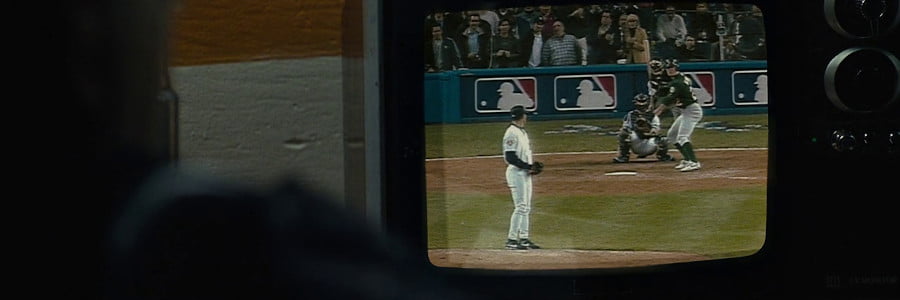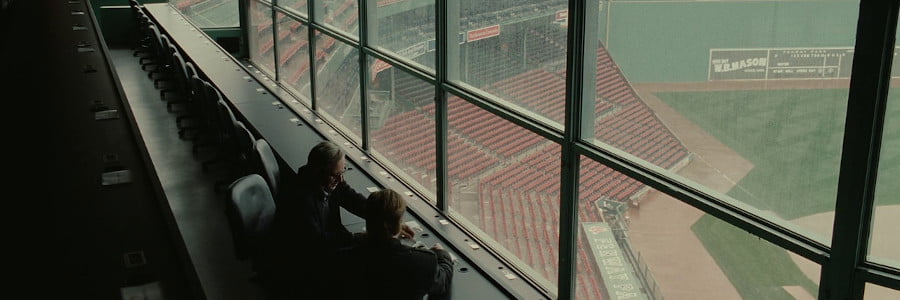Lots of movies are about games. Most of them are kind of bad – sports movies famously depicting weird strategies or rules loopholes or just bad versions of how their games are played to create the most dramatic moments. And if your sport is one of the heavily merchandised sports in the United States, your sport has absolutely got a set of movies, filling the niches of What If Sports, What If Sports But Girl, What If Sports But Animal, and eventually, What If Sports But Your Dad Cries. Moneyball is firmly in that last category, a rhapsodic story about how important a game Baseball is to culture, which is why it’s mostly only played by three countries, and I know someone’s coming along to go hey, you forgot Poland and I do not care.
Ostensibly, Moneyball, a 2010 film about a 2002 season of ‘Baseball,’ the 1845 game, follows Billy Beane, a lone, hard man, a bitter and tormented man, a baseball man, where he took the conventional wisdom to the table, rejected the model of running a baseball team and defeated the system with facts, and logic, showing that once and for all, baseball doesn’t care about your feelings.
I promise, promise, promise, this tone is necessary.
Because Moneyball as a movie owns bones.

Like, this movie is amazingly well made. It’s deeply affecting, it’s emotionally engaging, it’s made up of all these tight slices of excellent filmmaking. The whole movie is a highlight reel. There’s barely a bad moment in the whole thing. Brad Pitt is an amazing actor who makes Billy Beane’s emotional depths exist, Jonah Hill plays [NOT ON FILE] with a sort of soft emotional nerdiness that you’d need to carry off the idea of playing this one lone human whose work completely upended the entire system of how Baseball worked. To play him as more arrogant or more assured or more friendly or more prone to talk about his ideas or share about them would take over the screen, would see bombastic. It’s not how the story of the Smart Guy enabled by the Baseball Man should work. Jonah Hill carries it off excellently.
Directorially, the movie is nearly peerless, with this beautiful weaving of documentary footage and filtered movie scenes, creating this hyperreality that’s all tuned carefully to the inner life of this intense, brooding, thoughtful lover of winning baseball, Billy Beane. There’s this recurrent visual motif the movie does, where he’s never shown at the games, barely ever shown with the players, and is instead seen at a distance, remote, listening to the game on the radio or watching it on the TV in a gym. It means you’re not watching him in the game, you’re watching him watch the game, in silence, and it creates this eerie quiet moroseness around the games.
The science and the math around the games are there, too, semi-explained by Jonah Hill’s [STATIC SOUNDS], along with these delightful examinations of players who aren’t ‘good’, don’t have ‘confidence’ but still manage to have secret value you can obtain if you Crunch The Data at them. The music is breathtaking, too, all swelling and beautiful when it wants to be, and completely missing when you’re meant to feel alone and overwhelmed by the opposition.
As a movie, Moneyball is excellent.

I’m not really here to provide an authoritive breakdown on the history of Sabermetrics (the science of Baseball this movie purports to depict), because this movie also isn’t that. The guy who developed the system that the whole movie is about – Michael Lewis, he was in it, originallly, he was originally a character, then asked to be removed from it because of how this movie took liberties with reality. This movie tells you a story about how Sabermetrics maybe got their start in the game, and how they kinda work, and things like the key players involved in making it happen, but it’s all… well, it’s all deeply unrelated to the things the game is about.
This isn’t a movie about baseball. It’s about something that happened, in the baseball industry. It’s about the way that baseball teams are made for a commercial enterprise, it’s about people who do play baseball, but they may as well be playing tag for all that the movie actually gives a shit about them. And the movie has a skewed perspective.
See, the movie positions this as a story about a rich team’s ability to take advantage of poor teams. The existing paradigm for team recruiting was cyclical. The poor team spent its time finding new talent and signing them before they were worth a lot of money, and get a season or two out of them before they were scooped up by much richer teams that could take advantage of them. This system is seen as a bad route for this poor team to compete with the rich teams, because if they find a new player, they will, eventually, be bought by a richer team.
It’s an interesting thing – strategically speaking, the team is basically buying lottery tickets. And, in the real history, they’d found quite a few – these talent scouts had apparently developed some really good pitchers (that are downplayed or demoted to extra in the movie). Still, the movie narrative wants those guys to be wrong, to build the narrative that Billy Beane is facing unreasonable opposition, so we have to leave that detail out.
Beane describes the current economic situation thus:
There are rich teams, and poor teams, then fifty feet of crap, then us.
Billy’s team has forty million dollars. The team he’s comparing them to, the richest team at the time, had a hundred and forteen million dollars. That is, he’s facing a team with a budget that’s twice as large as his, again, which sounds like a real impossible barrier, but his vision of not just a poor team, but the worst possible scenario is an immense discrepancy of 66%.
And he has forty million dollars.
Imagine that being your vision of the impossible gulf of poverty. Imagine when you try to tell a story about a struggling underdog and you still have forty million dollars. The whole framing of this movie is about how he can make his team win the entire championship except nobody was asking him to do that. The whole framing is Beane giving himself this unreasonable expectation, and then, desperate to make it happen, tried something that categorically recontextualised the sport.

This story is not about how a poor team can beat a rich team. It’s just about the example that showed how baseball was going to evolve, how the Sport Of Nerds could accumulate another way that nerds could nerd at it. It’s about how a poor team tried something that was already out there.
And it has to sacrifice so much to do it. Everyone who isn’t Beane in this narrative is excised or morphed or made into a sort of bystander to this difficult man’s driven excellence – and like, in the context of baseball, they’re all real people. Real people who were doing other things, including, uh, copious quantities of steroids.
Look at the ways Beane talks about things. The metaphors. He talks about dying and he talks about suffering and all of this is about not just baseball, but about succeeding in the business of baseball. He skips out on important conversations with people, he clubs people with his authority, he lashes out and yells at people, he treats them with no respect. He describes his situation as being the last dog at the bowl, the runt of the litter, and that that dog, dies.
The team isn’t dying, Billy.
The team just isn’t succeeding at the thing you want it to.
And you want to do it because you’re not over not being a bigger success.
There’s a thing to talk about, sometime, about the way that the games of the American empire are militarised. There’s a whole culture about the way that the games are restructured and the play is turned into replicated authority systems of capitalism. There’s something that will always jar with me about the first guy through the wall always gets bloody, when we’re talking about someone with terrible leadership skills and awful communication getting criticised for his team doing a bad job.

I’m not going to lie, I kind of hate this movie.
I guess, it’s not that I hate it, hate it. It’s a really well made movie, it gives you this taut, inspiring, exciting feeling. There’s a good dramatic arc, and the way it weaves in real-life replications, documentary style, is impressive. The characters have engaging dynamics. Actors who are all very good at acting all do a good job of doing their job at the script, which is very well written.
It’s just that this movie lies about the input of everyone into this equation to set the stakes for this movie as being Billy Beane Maybe Has To Get A Different Job.
And like… I just don’t care. This movie had all the control in the world to show us the man they thought Billy Beane should be to tell this story, and with all that control, they chose to show me a guy who I think could do with getting bounced from baseball and maybe find a job where he could learn how important it is to actually be nice and that winning isn’t everything.
You know, a lesson that we teach little kids.
This movie isn’t about loving baseball.
This is an excuse.